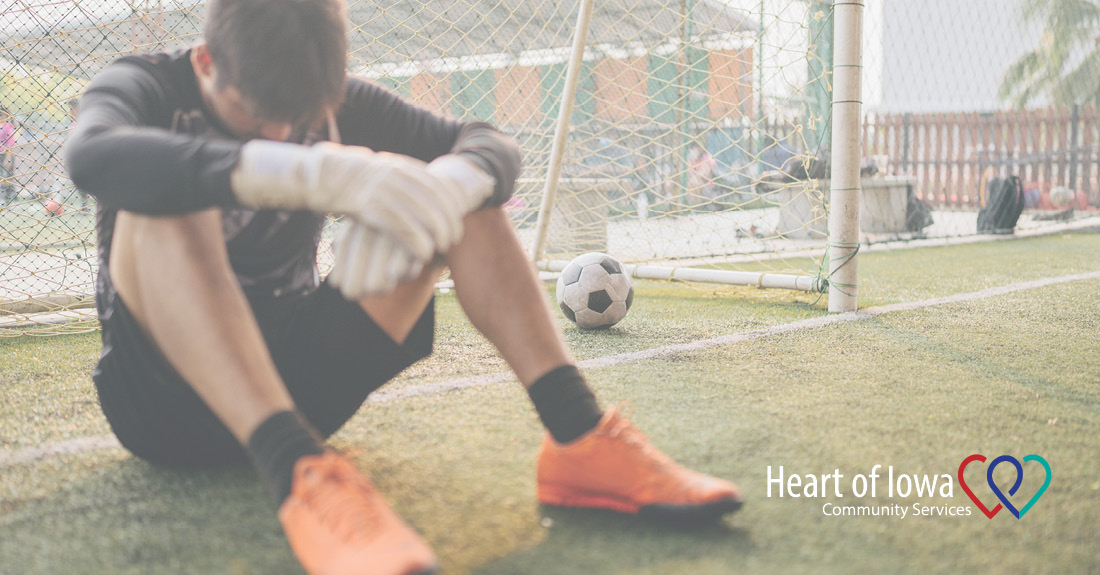So your child or teenager lost the big game, bombed a test or assignment, missed out on the big part in the play, or experienced another crushing disappointment in the life of a high-achieving adolescent. That doesn’t mean they’re “a loser”; it simply means they are experiencing a loss.
Of course, parents, guardians, mentors and other adults know that these milestones are part of growing up, but that doesn’t make it any easier for the person experiencing them.
Heart of Iowa Community Services (HICS) offers some tips on how to react when your loved one can’t seem to cope with an academic, extracurricular or social loss.

Why is my child so upset about this loss?
If your child is really struggling to handle a disappointment or loss that may seem trivial to you, it likely means they’re experiencing a symptom of something more serious. Remember, children and teens often lack the skills to recognize and voice their mental health symptoms. That means they often show their struggles through negative behaviors like acting out, self-medicating, speaking or acting negatively about themselves, isolating, exhibiting depressive symptoms, and more.
Here are some reasons your child may be feeling a disappointment so severely.
They are high-achieving. Your child or teen may simply be acting like a sore loser because they aren’t used to being disappointed! Whether they always ace the test or get the solo, they are used to winning and feeling like they’re in control. Losing control upsets kids, teens and adults alike.
They needed a “win.” Children and teens rapidly experience new stages and phases of life. Whether it’s hormonal fluctuations, social pressures, changes in their home life, etc., they are going through a lot. Just like adults, it’s possible they’re feeling stretched thin in many areas of their life, and losing this game or not achieving a personal record was the last straw.
They’re experiencing more. As explained above, a child or teen can face just as many stressors as adults, if not more. These stressors could be a symptom of depression, anxiety or other existing mental health struggles that are or are not yet identified by a parent or mental health provider. In fact, as many as 10% of American youth ages 3 to 17 are diagnosed with depression or anxiety, and that number is increasing.
They model your behavior. Your child or teen may not feel supported or safe in a loss. Whether you feel their losses acutely or not, they may feel like they have to shoulder your emotional burden. Your child or teen may also have seen your negative reactions to disappointments in your life or the way you reacted when they didn’t perform to your standards previously.
What can I do if my child can’t cope with a loss?
Parents often want to shelter their child from the negative facets of life. Actually, that’s the opposite of what you should do. Experiencing difficulties helps them grow and develop into resilient adults. Instead of shielding your child, focus on supporting them through the loss in the following ways.
Prepare them for a disappointment. Before the big game or performance, talk to your child about the fact that they may not get what they want and that’s OK. Come up with a plan to celebrate the win and a plan to celebrate the loss.
Talk about what really matters. Giving your full effort is more important than winning, and it’s impossible to control all the variables that may affect the scenario. Children and teens will come to term with this, but the path to this lesson can be difficult.
Let them experience losses. Your child can experience difficulties, and you are capable of helping them through it without distracting from or ignoring negative experiences. After they lose a game or experience another difficulty, don’t jump right into giving a speech or problem-solving. Let them process silently and tell them you’re ready to talk when they are.
Model good behavior. When you experience a setback, do you hit the fan and let your emotions control you? If so, your child may have learned that this is a viable coping mechanism. The next time you or your child reacts this way, take a moment to pause and reset.
Seek help from a mental health professional. Just like you take your kids to the doctor when they’re experiencing a problem with their physical health, seeing a mental health provider on a regular basis helps to keep their mental state in good shape.
Is their reaction to a loss is something more?
If your child or teen is regularly unable to cope with a loss or disappointment, it may be time to seek help before they spiral further.
The important piece is not to trivialize what they are experiencing. Just like adults, the multifaceted pressures of life can negatively impact kids’ and teens’ mental health.
HICS is here to help parents, educators, mentors, coaches and kids. Learn more about our children’s services at HICSIowa.org.
